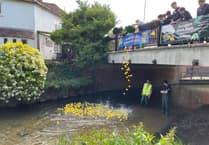The UK’S water companies should be renationalised to put “people and our environment before private profits”, a Conservative councillor has said after the extent of sewage discharges into the River Wey were revealed.
Cllr Adam Carew, district member for Whitehill and Greatham, spoke out after newly-released Environment Agency figures showed sewage was discharged 50 times from the Haslemere waste water treatment works, up river from Bordon, in 2022 – lasting a total of 636.74 hours.
A further 27 spills were recorded at Bordon waste water treatment works, lasting 415.77 hours, polluting Oakhanger Stream and the River Wey, as well as further spills at Huckers Lane and Arford pumping station.
Elsewhere locally, Thames Water’s Farnham site polluted the Farnham Park tributary with 25 spills in 2022, lasting 210.14 hours, and the Waverley Lane sewage pumping station put 16 spills into Farnham Bourne, totalling 118.18 hours.
Bentley saw 62 spills totalling 595.90 hours (nearly 25 days). Its sewage comes out into the River Wey between Alton and Tilford, affecting the river and the groundwater. And Selborne (39 spills, 416.84 hours) polluted the River Wey from Bordon to the River Slea junction.
At Liss waste water treatment works, 47 spills lasting a total of 542.9 hours – 22½ days – were recorded last year. Its sewage goes into the Western Rother upstream of Petersfield, affecting both the River Rother and Batt’s Brook.
And Petersfield waste water treatment works also saw 41 spills in 2022 totalling 328.97 hours (nearly 14 days). Its sewage comes out on the Stanbridge Stream, affecting the Criddell Stream.
Cllr Carew said: “It is unbelievable that here in the 21st century raw sewage is dumped into our rivers and seas at time of flood and high rainfall.
“What we need is an outright ban on the dumping of raw sewage into our seas and rivers.”
Describing the Deadwater as “a jewel in the crown for Whitehill and Bordon”, the former vice-chair of the Deadwater Valley Trust said he is “naturally very concerned that any sewage is being dumped” in either watercourse.
But Cllr Carew added while it is known sewage spills have been recorded in the Wey and Deadwater from the sewage works at Lindford over the past 20 years, the latest Environment Agency figures show “it’s even worse than I thought, with the Site of Special Scientific Interest Oakhanger Stream and Slea also affected”.
“Last year in 2022, according to the Environment Agency, raw sewage was pumped in to UK rivers and seas for 1.75 million hours, an average of 850 times a day,” he said.
“Quite apart from its impact on wildlife, it must be having a major detrimental effect to coastal towns and seaside resorts in particular during summer at a time when they are supposed to be at their busiest.”
Cllr Carew added water cycle studies were conducted for the regeneration of Whitehill and Bordon, and councillors were told by the water companies that Lindford sewage works could deal with a capacity from extra houses.
But he said: “If they are dumping raw sewage into our local river, then that is clearly not the case!”
Cllr Carew added: “Council planners need a serious dialogue with Thames Water, which deals with our sewage. We need a serious investigation into this problem as our town expands and the water companies need to propose a course of action to prevent it.
“Personally, I think all the water companies should be renationalised and brought back into public ownership, so they put people and our environment before private profits.”
Nationally, the Environment Agency figures show water companies released raw sewage into rivers and seas in England for more than 1.75 million hours last year, averaging 825 sewage spills into waterways per day.
This was down 19 per cent on the previous year. But the Environment Agency put the fall largely down to drier weather, not water company action.
While not illegal, academics and environmental groups say releasing sewage poses a danger to human health.
Companies release sewage, including effluent, wet wipes and sanitary products, when there is too much demand on their treatment works during rainy periods.
This pose a serious risk to wildlife, swimmers and other users of UK waterways.





Comments
This article has no comments yet. Be the first to leave a comment.